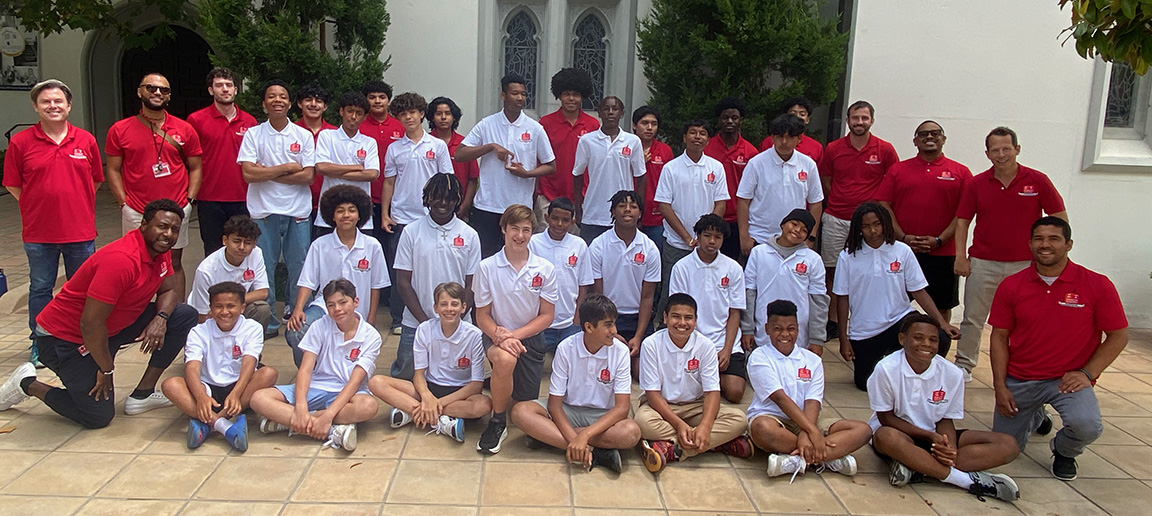
Teachers, counselors and students – known as “reachers” – gather at the Reach Academy at All Saints Church, Beverly Hills. Photo: Matthew Arnold
[The Episcopal News] “Positive masculinity” was just one of many lessons Brad Flores, 16, learned over the summer as a counselor at the Reach Academy for Young Men, a four-week summer program at All Saints Church in Beverly Hills.
“They offered classes that are not like classes you normally take in school,” said Flores, an 11th grader at Cathedral High School in downtown Los Angeles. He particularly enjoyed film production and art and design, and the history of the universe, but valued lessons learned from the younger students he mentored, who are known as “Reachers.”
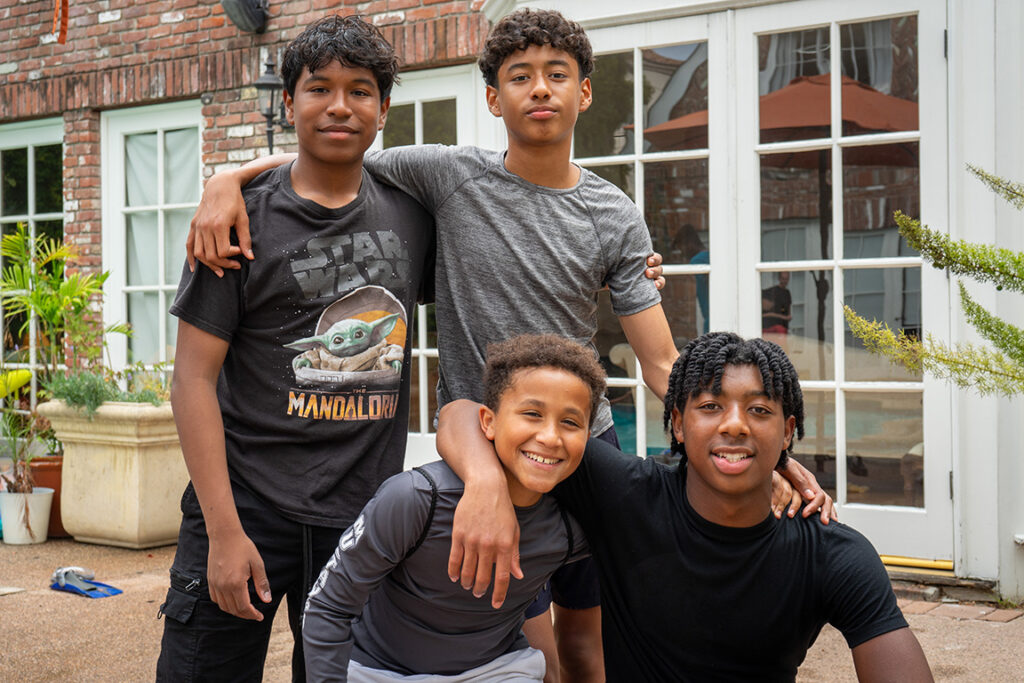
Teenagers learn from their classes and each other and form enduring friendships at the Reach Academy. Photo: Megumi Calver
“I had it in my mind that I would be someone to watch over the kids” as a counselor, Flores told The Episcopal News. “But it was completely opposite. I got to learn myself, not only from the classes I took but from the kids themselves. We were learning from each other.”
They learned that vulnerability and sharing awareness and feelings are not only acceptable, but desirable. “Every day at the start and end of the day, we would have a common-ground gathering where everyone as a group met up and talked about our experiences and what we learned, and often shared stories about ourselves,” Flores said.
“We got to a point where we felt comfortable sharing personal things that said a lot about us, in a good way.”
Reach Academy is a three-year-old program created by Nat Damon, author, educator, and All Saints’ parishioner, in response to the post-pandemic isolation and disengagement of teenage boys, he told The News recently.
“When we began bringing students back on campus in the Spring of 2021, I noticed those returning were mostly girls,” said Damon, then an interim middle school director at the Archer School for Girls in West L.A. “I started asking about their brothers and I’d get an eye roll and an ‘I have no idea. He’s in the bedroom playing video games, with the door shut.’”
The 15-months of pandemic-induced remote learning for L.A.-area students led to disengagement and “crystallized a lot of what I’d been consulting about, which is the need for us to look at teaching and learning through a spiritual lens,” said Damon, whose Reach Academics consulting firm focuses on igniting students’ passion and “the idea of a spiritual core that I’ve always believed existed in healthy classrooms and healthy school environments.” Damon has also written a book, Time to Teach, Time to Reach, about the power of relational teaching.
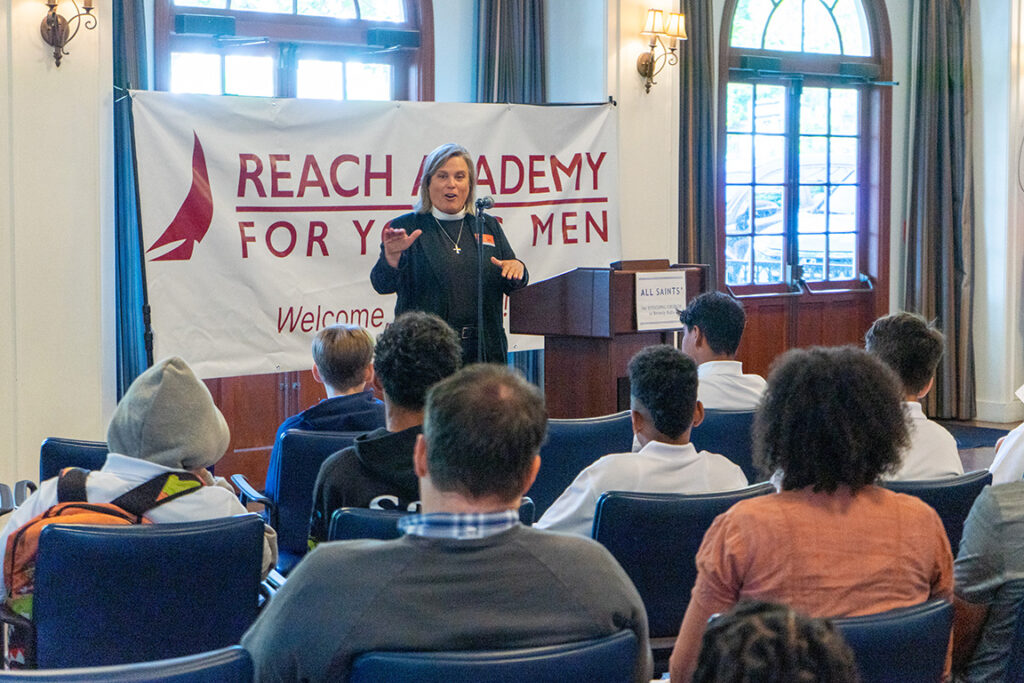
Andrea McMillin, priest in charge at All Saints’ Church, Beverly Hills, welcomes students to the Reach Academy. Photo: Megumi Calver
Students choose three classes per day from a selection of courses, including: “Ctrl+Alt+Del: Empower Your Mind”; “The Me Everybody Should Know”; Neurobiology of the Teenage Brain”; “You Be the Judge,” taught by a Superior Court judge; “Superheroes Among Us”; “Public Speaking and Civil Discourse”; and “The Screenwriter’s Craft: Action Screenwriting.”
Classes were held from 8:30 a.m. to 4:30 p.m., Monday through Friday in June and July, with 38 students ages 13 – 16. Students are selected through an application process and admitted without any consideration for financial capacity. Tuition ranges about $3,500, on a sliding scale and the academy is funded through private donations and grants, he said. Next year, a fifth week will be added.
Blaze Hinton, 15, said attending the academy a year ago was “one of the best experiences I ever had. At first, I didn’t want to go, because it was taking me away from my summer,” he recalled. “But, after the first two days, I was really excited to go back. It took me away from my phone, but I was fine with that because of memories and connections built.”
The academy teachers and their teaching methods “are amazing,” added Hinton, an All Saints’ member, and student at L.A.’s Loyola All Boys School. “They always help you, no matter what. They help you find your passions, and teach you about the real world, and how it will be when you grow up and start working and try to make a business for yourself. This is not academics; this is the real stuff.”
Like Thomas Warfel’s financial literacy class. “One of the first things we discuss is, what is money? Why is it valuable? Why do we use it, and care about it?” Warfel told The News in a recent telephone interview.
“It is pretty common for people to see money as a mythical thing rather than what it actually is, a valuable tool,” he said. “The main point is money is only valuable because you use it buy to things to make your life better. Money itself is not the goal. The goal is to be financially secure. And then we discuss what you can do to set yourself up for success so you’re financially secure.
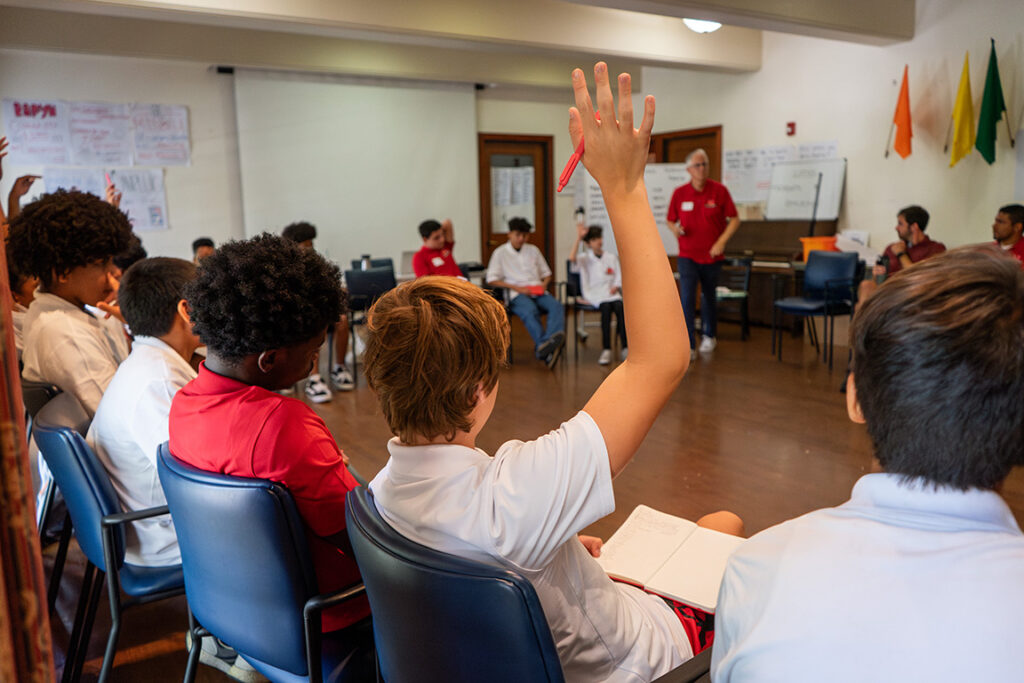
Academy students and teachers gather at the beginning and end of each day to share their experiences. Photo: Megumi Calver
“We talk about how debt can be useful and dangerous, how interest rates work … about budgeting, using the 50-30-20 rule as a very general guideline. It has been recommended you spend about half the money you make on things you need, about 30% on things you might want, and about 20% savings.”
The classes, as well as an overnight retreat/camping trip “can take you out of your comfort zone,” added Warfel, 30, who teaches at the Abraham Joshua Heschel Day School in L.A. “Maybe about half the students had ever been on a camping trip in their life before. They were doing something new with people they might not know that well. You can only grow if you’re outside your comfort zone.”
Kayne Langston’s “Ctrl+Alt+Del: Empower Your Mind” class taught students the art of becoming aware of and controlling emotions, altering behaviors and deleting negativity, he said.
Langston said the class helped students discover answers to such questions as “who in your life is affecting your dreams? Who are your dream protectors? And learning to delineate between friendship and people who might lead us to danger.”
Students may then “delete” negativity and allow themselves to feel their full potential, he said, by “believing and making sure the actions and choices you make are true to your heart. It is moving with purpose and passion.”
Inspiring passion and teaching leadership are academy aims, Damon said. “We inspire our students; they constantly look to us for our passion. Passion is like a fire inside. It’s easier to light that fire when we are reading body language, sharing energy, using the space together … creating an environment for boys where they can be free to take risks, to be vulnerable, to look at their definitions of masculinity through a very broad lens.”
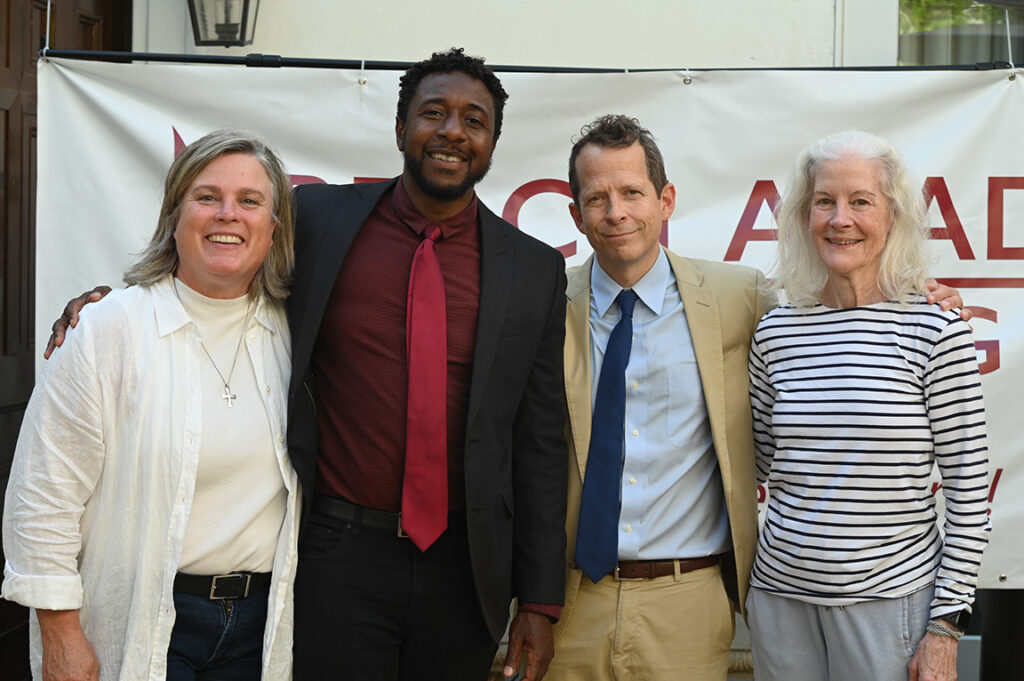
Leaders of the Reach Academy include the Rev. Andrea McMillin, priest in charge of All Saints’, Beverly Hills; Anthony Gaskins, director of the 2024 Reach Academy summer institute; Nat Damon, founding executive director of Reach Academy; and Hallie Foote, stewardship and pastoral care officer at All Saints’. Photo: Matthew Arnold
Leadership involves self-awareness, he added. “It’s easy to think about the loudmouths, the extroverted, charismatic social media or TV influencers, but true leadership can really be the shepherd from behind, guiding. Or the reflective leader, the one who observes a lot. That when they speak, you lean in.
“This idea of being a haven of leadership and learning in an all-male environment sends home the message to these boys that your masculine identity is not about being the loud-mouther, not about being always right; that really it is about being true to yourself. Whether you’re more quiet or more vocal, you embrace that part of yourself. Then we flip that and talk about our God-given weaknesses, or areas of challenge.”
Each day begins with a gathering, presenting an intention for the day, such as gratitude, fidelity, loyalty, humility – “something they know will track through the course of the day, so when we end the day at Common Ground, a closing circle, and every boy knows it’s the time of day when they’re guaranteed their voice is heard in the community.”
The academy has three deans – of creative leadership, experiential leadership and of culture and citizenship – and 10 faculty members and is funded through private donations and charitable agencies, Damon said.
“It is all about wonder. We’re lighting the fire of imagination in boys where society and the world are so unimaginative, where it almost feels like every idea has taken place. They have AI and they also have the world at their fingertips. It is extremely daunting and can be emotionally overwhelming, so much that we all have to detox from information flow.”
Student growth is acknowledged in a compilation of letters from teachers at the end of the academy, not a report card, Damon said. “If nothing else, our purpose is for each student to know he was seen during those four weeks.”
Warfel added, “The students are choosing to be here. This is learning for the sake of learning – that’s why they’re here.”
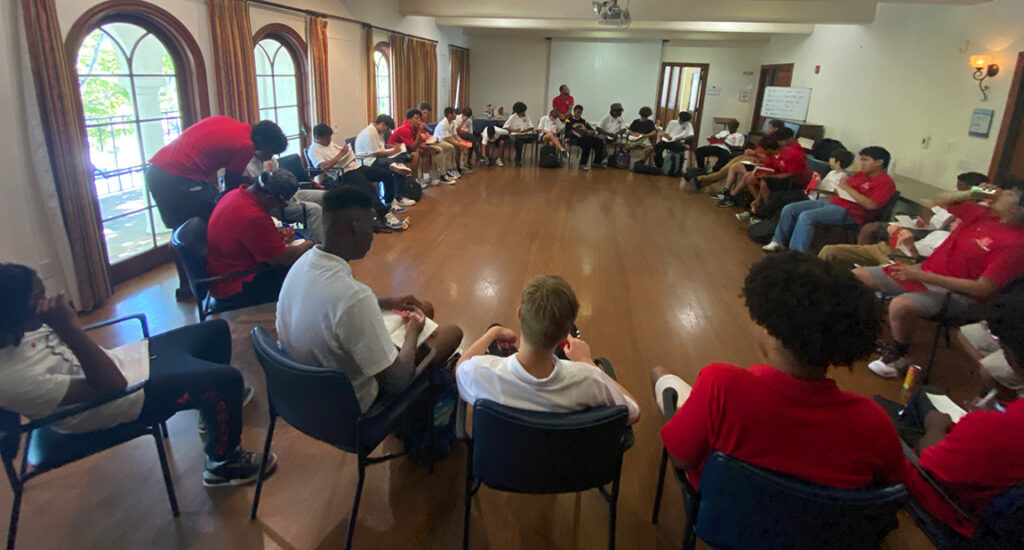
Students learn that their voices are welcome and heard at the daily gatherings. Photo: Matthew Arnold
The Rev. Andrea McMillin, All Saints’ priest-in-charge, hosts the students for a pizza and pool party on Fridays at the rectory next door. She and her dog, Lulu, are a very popular part of the academy.
“It’s been so wonderful to have our halls filled with young men who are exploring and learning about community and connection and empathy,” she said. “It felt like such a perfect use of our space for the summer; we came alive with it.”
The academy’s impact on the life of the church has been palpable, she added. “For a parish to witness kids from 22 schools all over L.A. come here and experience this sacred space – we all felt like it helped us look outward.
“And to be a safe sacred space where these kids can come and flourish into the young men God has called them to be. That’s what this church is all about. That’s what church is all about. This is an example of what church is called to be.”
